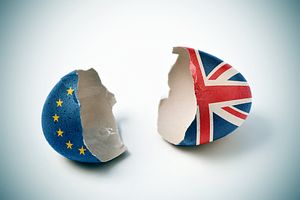Britain scored a game-changing goal with “Brexit,” but the ball landed in its own net and the point, it seems, has gone to China.
Let’s rewind. Remember the line “greed is good” from the film Wall Street? Asher Edelman, the inspiration for the character of Gordon Gekko, was one of the pioneers of computer trading. Soon everyone was using computers because they were crazy fast and could easily move tons of shares, but being able to unload millions of shares in seconds led to the panic known as Black Monday in October 1987, two months before the film came out.
It took over a decade for the world to recover and by then Britain had grown so sick of recession that they’d replaced Margaret Thatcher, a longtime opponent of European unification. Many thought Britain had suffered by resisting integration and that it would prosper by leaning in, and it did prosper, but mostly because the recession ended. Skip ahead to 2008 and things are bad again, again for unrelated reasons, but again Britain blames its EU membership status — this time in the other direction.
So David Cameron won the party’s leadership by promising to yank the Conservative Party from the European People’s Party. In 2012 he suggested a vote on whether to stay in the European Union, not because he thought Britain should leave, but because he wanted to win the support of his party’s Eurosceptic faction. He made a bad gamble, and here we are.
Why is this a goal for China? Because Britain’s financial representative in the European Commission, and Nigel Farage, the U.K. Independence Party leader and the tip of the Brexit spear, as well as Cameron himself, have all announced their resignations. Britain is without the power of the EU bloc and without leadership on either side.
In addition, the pound has hit a 31-year low against the U.S. dollar, investors are fleeing, property funds are freezing trade, and now there’s talk of a yet another recession — not to mention Scottish independence.
Simply put, the United States and the European Union are counterweights to Chinese and Russian power and breaking them down makes Beijing and Moscow stronger. As The New York Times recently argued, “Mr. Putin … in recent years has worked to divide and destabilize Europe” and so “for him … the British vote is an unexpected gift.”
How has Putin worked to divide Europe? Well, he sowed the seeds of discord along Europe’s edges by supporting Bashar al-Assad’s regime in Syria, annexing Crimea, and occupying the Donbass region of eastern Ukraine. Ukrainian and Syrian immigrants have subsequently rushed into central and western Europe and beyond, but did Putin mastermind the nativism that resulted? That’s giving him too much credit, but when it did happen, he nurtured it, for instance by partly funding UKIP.
But while England turns its back on the dream of an open and united European society, and Putin congratulates himself for his puppetry skills, what about Xi Jinping?
Kerry Brown writes that British companies will have a hard time navigating the troubled waters of Chinese markets, while “China will be highly aware of its increased leverage and power back in Britain.”
He adds that with vision and intelligence it’s still possible for London to establish itself as a global leader, “but such leadership is hard to see in the current ranks of politicians in Britain.”
“Even a fully united Europe — burdened as it is by debt woes, high costs, overbearing bureaucracy and, in some cases, dubious competitiveness — has had a tough time competing and contending with China,” writes Michael Schuman, who agrees that China is the clear winner in a post-Brexit world. “Now fractured, the EU can’t help but pose less of a counterweight to China’s rise on the world stage.”
So yes, Brexit makes China stronger, but there’s a habit of claiming anything that’s bad for the West is good for China, which isn’t always true. Destabilization of the West in general seems like more a Moscow goal. Rebalancing power away from the United States in particular is more a Beijing goal, and a stronger EU bloc, even one that tilts toward Washington, helps accomplish that.
Plus, whatever our self-serving geopolitical aims, we profit from a more stable Asia, and similarly, China profits from a more stable West. Xi did, after all, express his hope that Britain would remain in the European Union. Thus, in the end, it’s probably not so accurate to say Brexit means that China has won, but that it’s lost less than the rest of us.

































